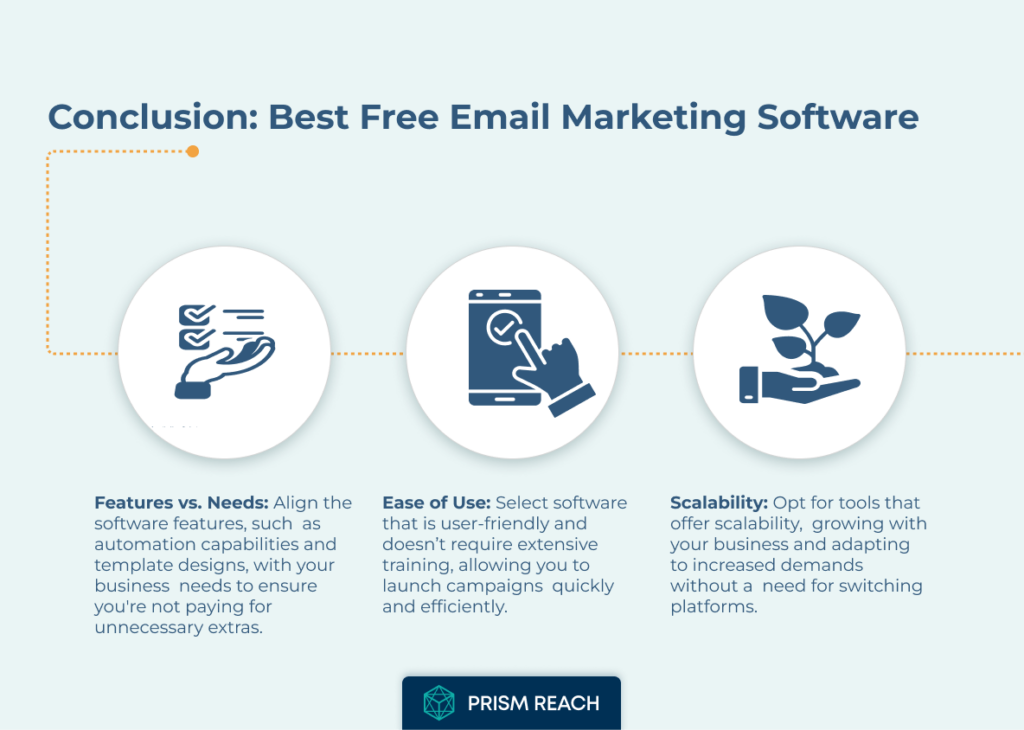Email marketing remains one of the most effective strategies for engaging with your audience, nurturing leads, and driving conversions. Whether you’re a beginner or an advanced marketer, choosing the right email marketing software can significantly impact your campaign’s success. This comprehensive guide explores the best free email marketing software available in 2025, integrating hidden gem strategies to enhance your email marketing efforts. Additionally, we’ll delve into Prism Reach, an innovative AI-powered tool designed to elevate your email campaigns through deep personalization.
At a Glance
Choosing the right email marketing software can be daunting, given the plethora of options available. Here’s a quick overview of some top free email marketing tools that cater to various needs:
- Sender: User-friendly interface with robust automation capabilities.
- Brevo: Comprehensive features including advanced segmentation and AI-powered optimization.
- MailerLite: Balances simplicity with powerful functionality, ideal for beginners.
- Moosend: Affordable and feature-rich, suitable for growing businesses.
- Mailchimp: Extensive template library and scalability for businesses of all sizes.
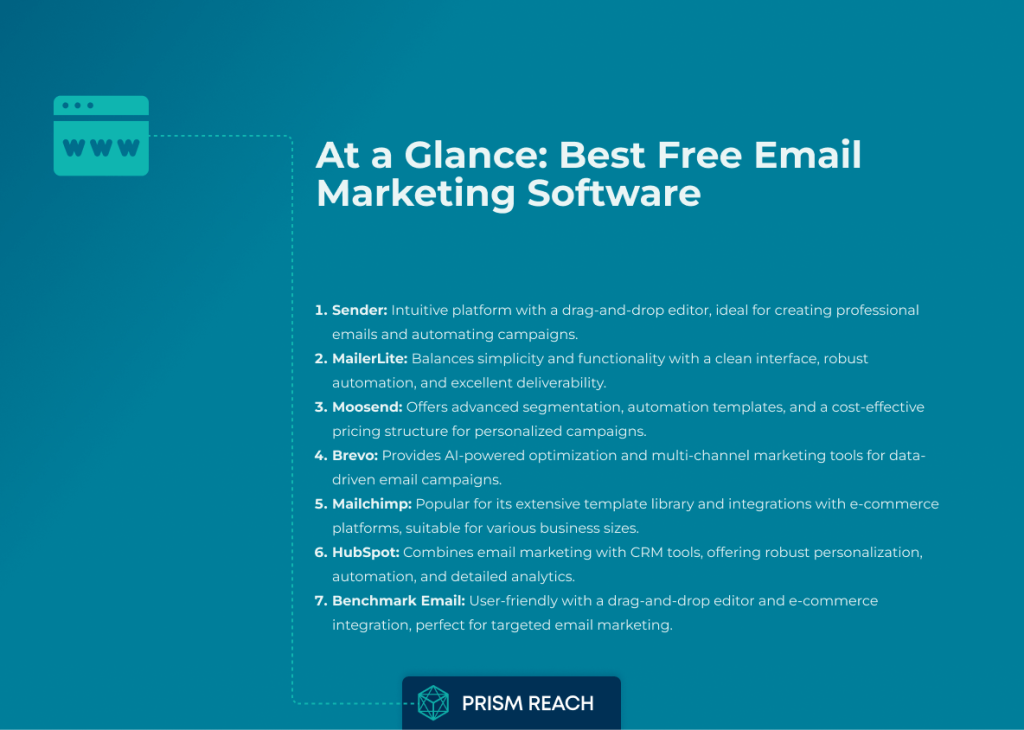
Upgrade Your Email Marketing with AI Personalization!
Best Free Email Marketing Software
Sender
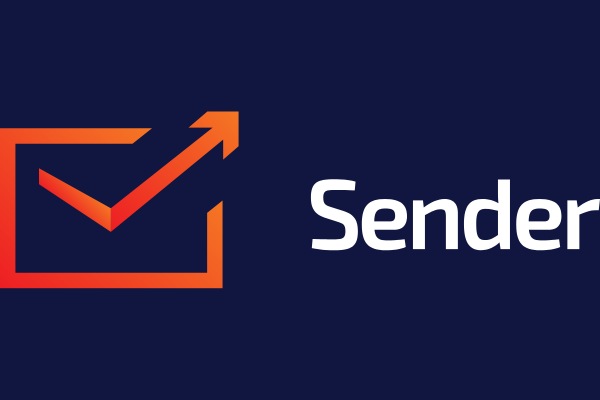
Pros:
✅ Free 15,000 emails monthly.
✅ Advanced segmentation tools.
✅ Supports 2,500 subscribers.
✅ Integrates with numerous apps.
✅ Comprehensive automation.
Cons:
❌ Outdated editor interface.
❌ Lacks pre-built workflows.
MailerLite
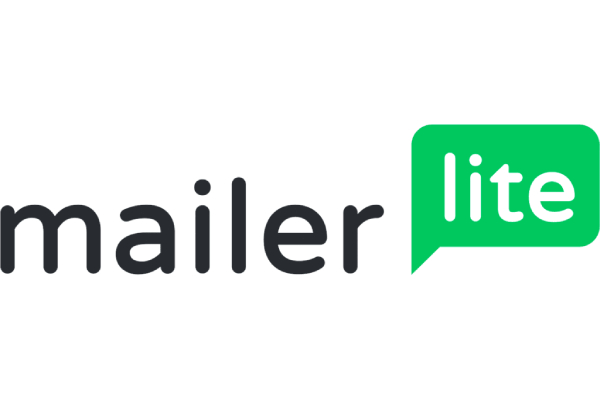
Pros:
✅ Free 12,000 emails monthly.
✅ User-friendly interface.
✅ Dynamic content blocks.
✅ Landing page creation.
✅ Robust free plan features.
Cons:
❌ No pre-made templates.
❌ Limited design flexibility.
Moosend
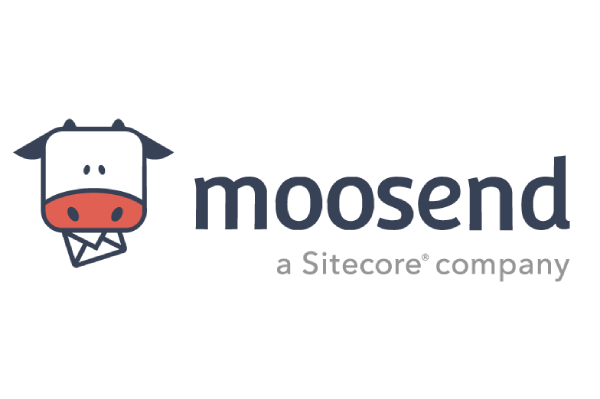
Pros:
✅ Precision segmentation.
✅ Automated campaign triggers.
✅ User-friendly interface.
✅ Free powerful tools access.
✅ Detailed behavioral data.
Cons:
❌ Limited advanced features.
❌ Basic customer support.
ActiveCampaign
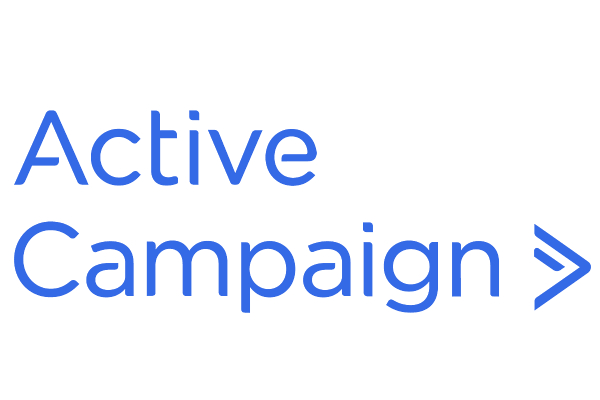
Pros:
✅ Advanced CRM integration.
✅ Comprehensive automation.
✅ On-site messaging and SMS.
✅ Customizable segmentation.
✅ Strategic customer insights.
Cons:
❌ Complex user interface.
❌ High cost for full features.
Brevo
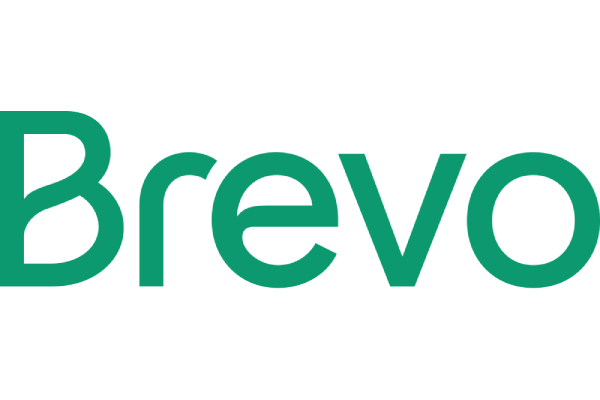
Pros:
✅ Unlimited subscribers support.
✅ Free 9,000 emails monthly.
✅ CRM and SMS marketing features.
✅ Comprehensive automation capabilities.
✅ Flexible and dynamic segmentation tools.
Cons:
❌ Daily 300 email sending limit.
❌ Lacks detailed analytics.
HubSpot
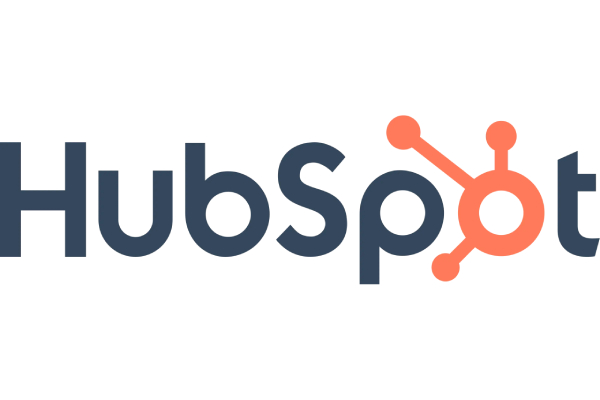
Pros:
✅ Integrates CRM with email.
✅ Unlimited users and contacts.
✅ Free 2,000 emails monthly.
✅ Extensive form-building tools.
✅ Supports collaborative use.
Cons:
❌ Limited monthly emails.
❌ Basic email templates only.
Mailchimp
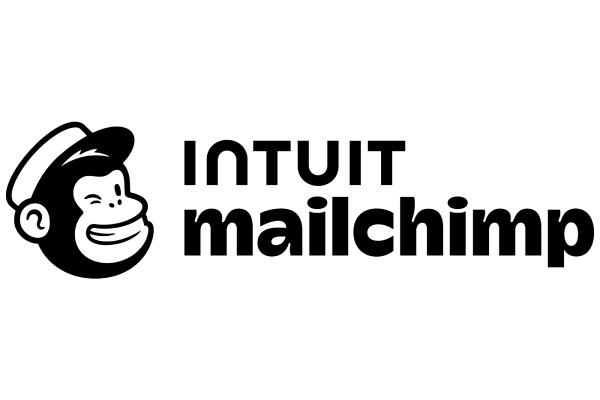
Pros:
✅ A/B testing capabilities.
✅ Customer journey mapping.
✅ Free 1,000 emails monthly.
✅ Advanced segmentation.
✅ Behavior-based targeting.
Cons:
❌ Supports only 500 contacts.
❌ Higher plans are pricey.
Benchmark Email
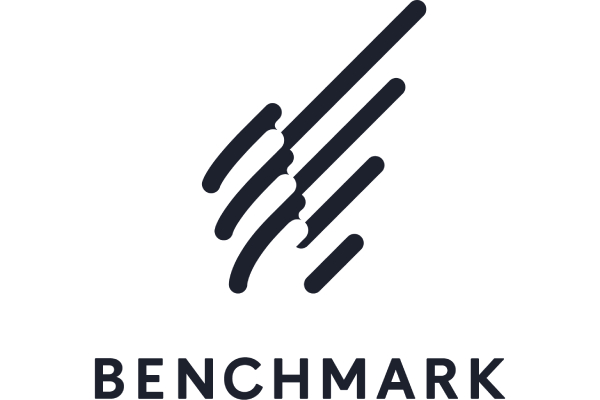
Pros:
✅ CRM for small businesses.
✅ User-friendly email builder.
✅ Free up to 3,500 emails.
✅ Responsive customer support.
✅ Customizable signup forms.
Cons:
❌ Limited free plan volume.
❌ No advanced A/B testing.
Best Free Email Marketing Software for Beginners and Small Businesses
Sender: Simplifying Email Marketing for Beginners
Sender stands out as a top choice for beginners and small businesses due to its intuitive interface and straightforward features. With Sender, you can effortlessly create professional-looking emails using the drag-and-drop editor and a wide selection of customizable templates.
Key Features:
- User-Friendly Interface: Easy to navigate, perfect for those new to email marketing.
- Automation Capabilities: Set up welcome series, abandoned cart reminders, and other triggered campaigns with ease.
- Seamless Integrations: Integrates with platforms like WordPress, WooCommerce, and Shopify, allowing for targeted campaigns based on customer interactions.
While Sender offers a generous free plan with up to 2,500 subscribers and 15,000 monthly emails, it may lack some advanced segmentation and reporting features found in other tools. Nonetheless, it’s an excellent choice for those just starting out.
MailerLite: Balancing Simplicity and Power
MailerLite strikes a perfect balance between simplicity and functionality, making it another strong contender for beginners and small businesses. Its clean and intuitive interface allows you to create stunning emails quickly and easily.
Key Features:
- Pre-Designed Templates: A wide range of templates to suit various industries and styles.
- Advanced Automation: Create multi-step workflows based on subscriber actions such as email opens, clicks, and purchases.
- Excellent Deliverability: Ensures your emails reach subscribers’ inboxes effectively.
MailerLite offers a free plan with up to 1,000 subscribers and 12,000 monthly emails. Its automation features are surprisingly advanced for a free tool, making it a valuable asset for growing businesses.
Moosend: Affordable and Feature-Rich
Moosend is an excellent option for those seeking an affordable yet feature-rich email marketing solution. Its user-friendly interface and comprehensive features enable you to create professional email campaigns effortlessly.
Key Features:
- Advanced Segmentation: Target subscribers based on interests, behavior, and demographics.
- Automation Templates: Easily set up welcome series, birthday campaigns, and other triggered emails.
- Extensive Template Library: Create visually appealing emails that align with your brand.
Moosend offers a free plan with up to 1,000 subscribers and unlimited monthly emails, making it an attractive option for businesses on a tight budget. However, its reporting and analytics features may not be as comprehensive as some competitors.
Best Free Email Marketing Software for Advanced Automation and Personalization
ActiveCampaign: Power of Automation
ActiveCampaign is a powerhouse when it comes to advanced automation and personalization. Its intuitive drag-and-drop automation builder allows you to create complex, multi-step workflows that guide subscribers through their customer journey.
Key Features:
- Deep Segmentation: Create dynamic segments based on subscriber behavior, preferences, and custom fields.
- Robust Email Design Tools: Includes a drag-and-drop editor, customizable templates, and dynamic content blocks.
- Comprehensive Reporting: Detailed insights into campaign performance, including open rates, click-through rates, and conversion metrics.
While ActiveCampaign does not offer a free plan, its paid plans are competitively priced and provide a wealth of features suitable for businesses looking to scale their email marketing efforts.
Brevo: Harnessing the Power of AI for Optimization
Brevo, formerly known as Sendinblue, is an excellent choice for businesses seeking advanced automation and personalization capabilities. Its AI-powered features and multi-channel marketing tools help create highly effective email campaigns.
Key Features:
- AI-Driven Optimization: Machine learning algorithms analyze campaigns to provide actionable insights for performance improvement.
- Comprehensive Automation Tools: Pre-built workflow templates and a visual automation builder for creating complex, multi-step automations.
- Dynamic Segmentation: Create segments based on subscriber behavior, preferences, and custom attributes.
Brevo offers a free plan with up to 300 emails per day, and its paid plans are reasonably priced, making it accessible for businesses of various sizes. However, some users may find the interface less intuitive when setting up advanced automations.
HubSpot: Combining Email Marketing with CRM and Sales
HubSpot offers a comprehensive marketing, sales, and customer service platform that includes powerful email marketing tools as part of its suite. Its seamless integration with HubSpot’s CRM allows for highly targeted and personalized email campaigns.
Key Features:
- Seamless CRM Integration: Create personalized campaigns based on subscriber interactions across various channels.
- Dynamic Content Blocks: Customize email content based on subscriber data for higher relevance.
- Robust Reporting and Analytics: Detailed insights into campaign performance and attribution reporting.
HubSpot’s free plan includes email marketing features with a limit of 2,000 emails per month. To access advanced features and higher sending limits, upgrading to a paid plan is necessary.
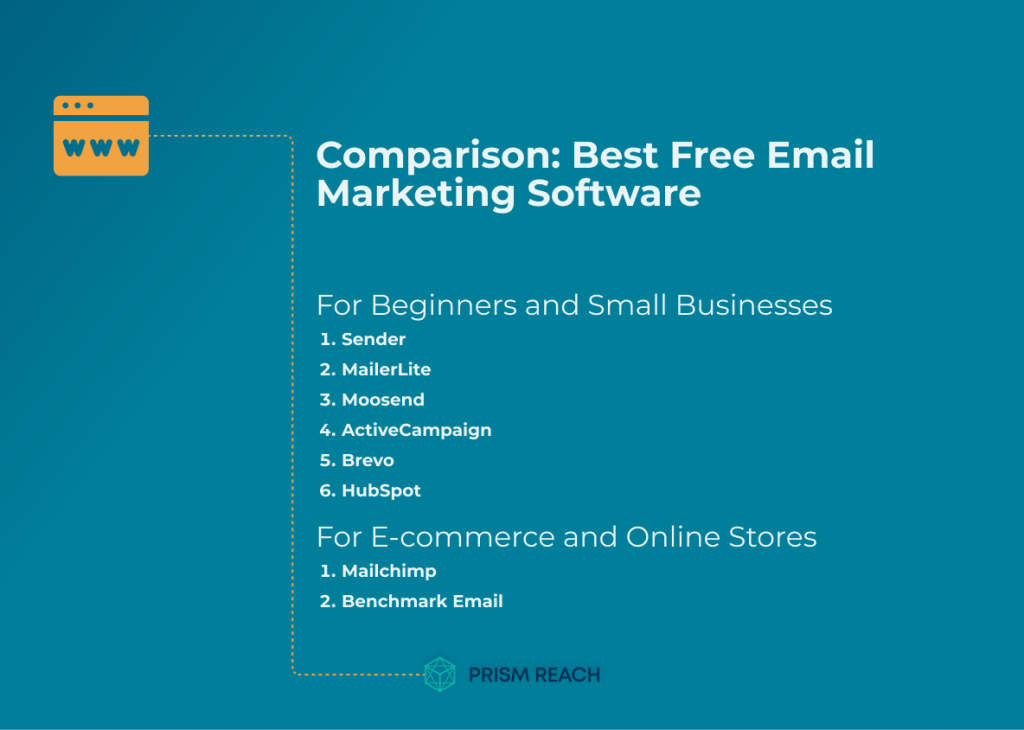
Best Free Email Marketing Software for E-commerce and Online Stores
Mailchimp: Empowering E-commerce with Targeted Campaigns
Mailchimp is a well-known email marketing platform that offers a range of features specifically designed for e-commerce businesses. Its user-friendly interface, extensive template library, and powerful automation tools make it ideal for driving sales and customer engagement.
Key Features:
- Seamless E-commerce Integrations: Integrates with platforms like Shopify, WooCommerce, and Magento for targeted campaigns based on customer behavior.
- Automated Abandoned Cart Emails: Remind customers of items left in their cart to encourage purchase completion.
- Product Recommendation Feature: Automatically generates personalized product suggestions based on browsing and purchase history.
Mailchimp’s free plan supports up to 2,000 contacts and 10,000 monthly emails. While its pricing can become expensive as your list grows, it remains a strong contender for e-commerce businesses seeking a comprehensive and user-friendly solution.
Benchmark Email: Streamlining E-commerce Email Marketing
Benchmark Email is another excellent choice for e-commerce businesses looking for a user-friendly and affordable email marketing solution. Its intuitive drag-and-drop editor and extensive template library make creating compelling email campaigns effortless.
Key Features:
- Seamless E-commerce Integrations: Sync customer data with platforms like Shopify, WooCommerce, and Magento for targeted campaigns.
- Automation Tools: Set up abandoned cart recovery emails, welcome series, and post-purchase follow-ups to engage customers effectively.
- Customizable Templates: Create visually appealing emails that align with your store’s branding.
Benchmark Email offers a free plan with up to 250 contacts and 3,000 monthly emails, making it accessible for small e-commerce businesses. Its paid plans remain cost-effective as your list grows, although its reporting and automation features may not be as advanced as some competitors.
Incorporating Hidden Gem Strategies
To elevate your email marketing campaigns, consider integrating these five hidden gem strategies that are often overlooked but can significantly enhance your effectiveness:
1. Interactive Email Elements
Incorporate interactive elements like polls, quizzes, or surveys directly in your emails. This not only engages your audience but also provides valuable feedback and insights to tailor future campaigns.
2. Gamification of Emails
Introduce gamified experiences such as spin-to-win wheels or scratch cards within your emails. These elements can boost engagement and lead to higher click-through rates by making the email experience more enjoyable.
3. User-Generated Content (UGC)
Encourage your subscribers to share their own content related to your brand, such as photos or testimonials, and feature this UGC in your emails. This builds community and trust while providing authentic content that resonates with potential customers.
4. Personalized Recommendations
Utilize data from your subscribers’ interactions with previous emails or purchases to send personalized product recommendations. This level of customization can significantly increase open rates and conversions.
5. Resend to Non-Openers
Take advantage of the “resend to non-openers” feature available in many free email marketing platforms. By sending the same email with a different subject line to those who didn’t open it initially, you can capture additional engagement without creating new content.
Prism Reach: Enhancing Your Email Marketing Efforts
Prism Reach is an innovative AI-powered SaaS solution designed to enhance the effectiveness of email marketing campaigns through deep personalization. This platform transforms how publishers and content creators engage with their audiences by using sophisticated AI algorithms to customize every aspect of newsletters based on subscriber behavior and preferences.
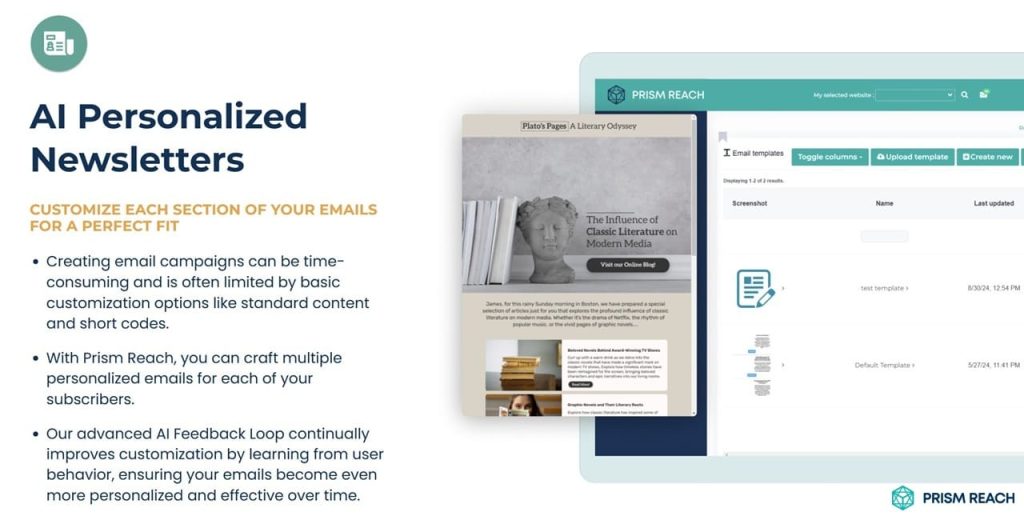
Key Benefits of Prism Reach
- AI-Powered Personalization: Delivers highly tailored content by analyzing subscriber behavior and preferences.
- Seamless Integration: Easily integrates with popular CMS and e-commerce platforms, streamlining your email marketing efforts.
- Predictive Analytics: Utilizes predictive analytics to determine optimal send times and content, maximizing engagement and conversions.
How Prism Reach Enhances Your Email Marketing
Prism Reach’s core functionality revolves around its proprietary AI technology, which clusters website content and social media posts into relevant categories. By creating detailed user avatars, Prism Reach enables personalized newsletter content that incorporates factors such as location, engagement history, and predicted interests. This advanced level of personalization leads to higher engagement rates, increased revenue, and stronger customer relationships.
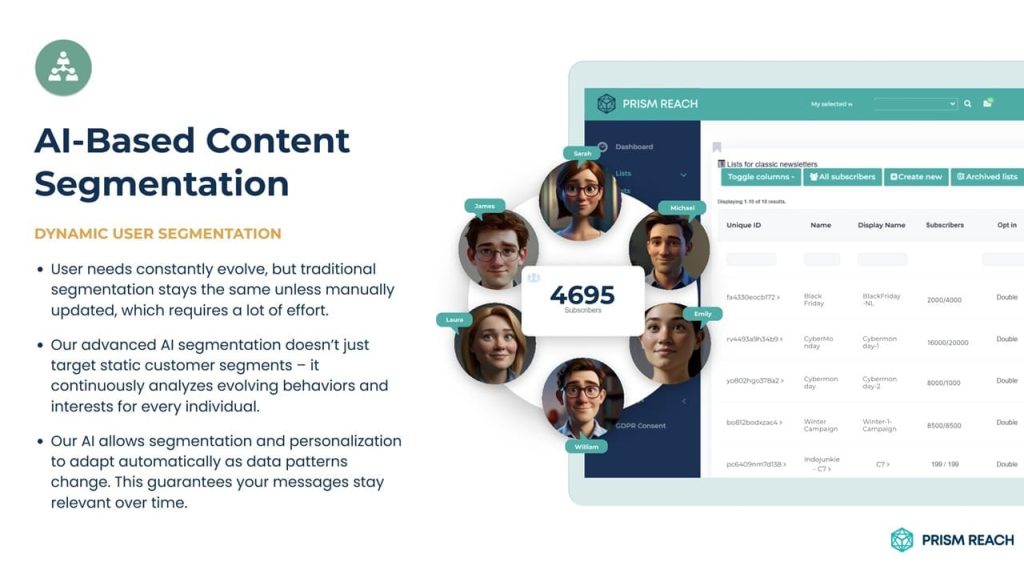
Incorporating Prism Reach with Hidden Gem Strategies
Prism Reach seamlessly integrates with the hidden gem strategies discussed earlier, enhancing their effectiveness:
- Interactive Email Elements: Use Prism Reach to analyze subscriber responses and tailor future interactive elements accordingly.
- Gamification of Emails: Personalize gamified experiences based on user avatars to increase participation rates.
- User-Generated Content (UGC): Leverage Prism Reach’s AI to select and feature the most relevant UGC for each subscriber segment.
- Personalized Recommendations: Enhance personalized product suggestions with Prism Reach’s deep data analysis.
- Resend to Non-Openers: Optimize resend strategies by using predictive analytics to determine the best subject lines and send times.
Benefits for Various Business Sizes
Whether you’re a mid-sized publisher or a small e-commerce store, Prism Reach offers scalable solutions to meet your email marketing needs:
- Mid-Sized Publishers: Enhance audience engagement with personalized content and dynamic segmentation.
- Small E-commerce Stores: Drive sales with targeted product recommendations and automated recovery emails.
- Content Creators: Build stronger connections with your audience through tailored newsletters and interactive elements.
Integration and User Experience
Prism Reach emphasizes a seamless user experience with its quick setup and one-click uploads, facilitating easy migration of existing subscriber lists. Its AI-enhanced sign-up forms are designed to increase sign-up rates and improve GDPR compliance, ensuring that your data handling meets the highest standards.
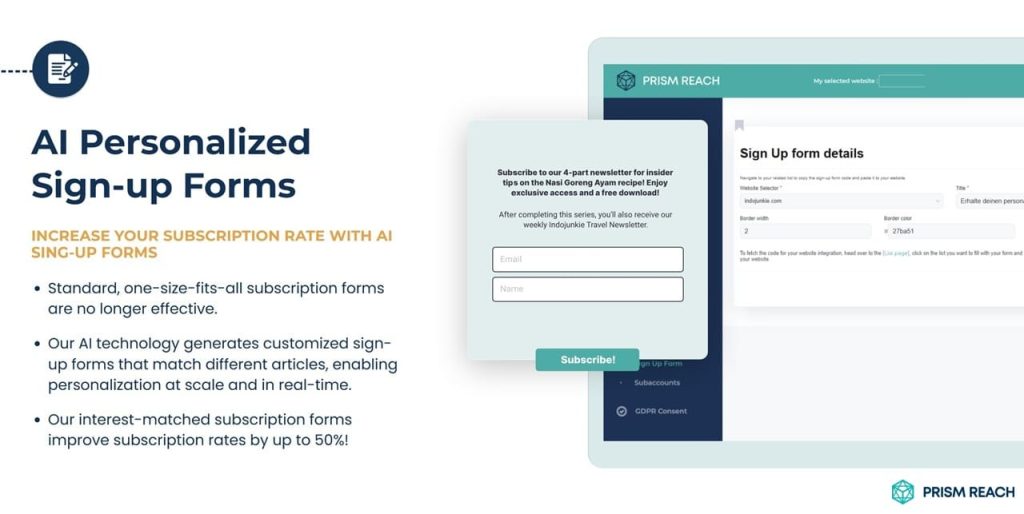
Future Prospects
Looking ahead, Prism Reach aims to expand its technology into the e-commerce sector and explore new ways to leverage AI for broader marketing applications. The company’s commitment to continuous improvement of its AI algorithms ensures that its solutions remain at the cutting edge of technology and marketing innovation.
Conclusion
Choosing the best free email marketing software for your business depends on your specific needs, goals, and resources. Whether you’re a beginner looking for a user-friendly tool, an advanced marketer seeking powerful automation and personalization features, or an e-commerce business aiming to drive sales and customer engagement, there’s a solution that fits your requirements.
Among the top contenders, Prism Reach stands out as an innovative AI-powered email marketing platform that offers unparalleled personalization and automation capabilities. By leveraging AI to understand and predict subscriber preferences, Prism Reach delivers content that is not only relevant but also timely, enhancing the overall impact of your digital marketing campaigns.
Incorporating hidden gem strategies such as interactive elements, gamification, and user-generated content can further elevate your email marketing efforts. Combined with the advanced features of Prism Reach, you can create engaging, personalized, and effective email campaigns that drive results and foster lasting customer relationships.
Investing time in researching and testing different free email marketing software options can pay off significantly in the long run. By choosing a tool that aligns with your business goals, target audience, and marketing strategy, you can maximize the impact of your email marketing campaigns without breaking the bank.
